CQ WEEKLY – COVER STORY
Sept. 29, 2012 – 12:54 p.m.
Screening the TSA
By Rob Margetta, CQ Staff
The Transportation Security Administration has a grandmother problem. In an era of serious debate about its mission, its methods and its future, the agency faces a Congress full of incensed lawmakers, many upset over reports about travelers’ difficulties with airport screeners. And nothing seems to get lawmakers more worked up than the image of a grandmother being frisked.
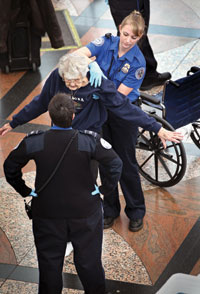
|
||
|
“They created a huge bureaucracy that feeds on itself looking for things to do, harassing grandmothers, veterans, wrestling children to the ground,” Florida Republican
“Shouldn’t we be looking more at the real threat, rather than the grandmother?” Texas Republican
Fueled by a steady drip of stories, particularly on conservative news outlets, alleging passenger screening follies, the TSA has become the go-to punching bag for Republicans trying to harness Americans’ frustration with Washington. The TSA is an easy target, with its ballooning budget and its large, far-flung workforce that literally touches many Americans on a daily basis.
The rising antagonism represents a dramatic shift for an agency that sprang out of the anguished response to the attacks on the World Trade Center and the Pentagon. And it’s a sign the country may be entering a post-post-Sept. 11 era. Republicans in particular, who spent the past decade pumping up their security credentials, now view the TSA as a symbol of big government that needs to be reined in.
Those who have pushed, with some success, to turn the screening process over to private contractors say they are simply conducting due diligence — trying to fix mistakes that were made in the creation of one of the government’s largest agencies during a period of national emergency. But it’s not clear at all that the changes being discussed will save any money or make the agency any more efficient.
After all, by some measures, the TSA has scored a clear success. No terrorist has staged a successful attack on a flight from a U.S. airport since Sept. 11. And the two most serious airline security breaches — unsuccessful bombs carried in shoes and underwear — originated overseas, beyond the TSA’s jurisdiction. This record has led defenders of the agency to accuse its critics of forgetting the impact of the terrorist attack that spawned the agency.
“For those of us who saw Ground Zero during the recovery period and actually saw workers working over the ashes of those towers, it really is alive for us,” says Texas Rep.
As the TSA has grown to a budget of $7.6 billion in fiscal 2011 from $5.3 billion seven years earlier, surpassing congressionally set staffing caps in the process, so, too, has Republican disdain for the agency risen. Jackson Lee’s opposite number on the subcommittee, GOP Chairman
“This was stood up very quickly,” Rogers says. “A lot of money was thrown at it, and we tried a lot of different things. And it’s grown very quickly. It’s time for us to get smarter and leaner.”
And if that means the TSA has become a target for anyone with an anti-government agenda, at least part of that criticism is deserved, Rogers says. “It’s easy to score points, because there are problems.”
Connecticut Sen.
Screening the TSA
“The Republican answers have been a bit formulaic or trite, the latest being to turn over all of this to private security,” Lieberman says. “I don’t see any guarantee in anything I’ve seen that it would be any less inconvenient or better.”
Size Matters
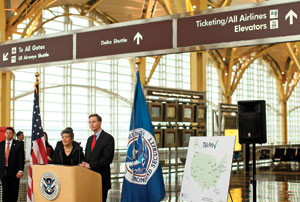
|
||
|
While pat-downs, body scans and other checkpoint hassles make headlines, what has arisen in terms of overall TSA policy is a debate among lawmakers about whether, at almost 66,000 full- and part-time federal employees, the agency has grown unacceptably large.
Perhaps no lawmaker better articulates the current ire against the TSA than Mica, who helped write the legislation in 2001 that created the agency and has since disowned it as his “little bastard child.” From the beginning, Mica pushed for airports to be able to “opt out” of TSA screening in favor of using contractors, calling privatization more efficient. At the TSA’s creation, the Democratic Senate insisted on a fully federal workforce but allowed a path for some airports to hire contractors instead. Just 16 of the nation’s 450 airports have pursued that option, and Mica says he wants that number to grow. He pushed legislation passed this year as part of the Federal Aviation Administration reauthorization law that would make it easier for airports to opt out.
“We never intended it to mushroom to this size,” Mica said during a March hearing.
While Mica’s rhetoric about the TSA has grown harsher over the past decade, his position on the agency’s size has remained consistent — and he isn’t alone. Almost immediately after the agency was created, appropriators were saying it had hired 6,000 too many airport security workers and calling for the TSA to downsize.
When concerns about homeland security were fresh in the minds of the public and federal spending was easier to come by, the issue received less attention. Today, a core group of critics, particularly in the House, persistently question whether the TSA passes a cost-benefit test.
“I remain concerned that since the TSA’s creation in 2001 — as its workforce has grown from an initial 16,500 authorized with 25,000 as its intended cap — that the 65,000 people working for TSA today represents too many people for too little protection,” said
To understand why Congress was willing to continue spending on an agency for years while lawmakers were concerned about its size requires remembering the state of aviation security immediately before the Sept. 11 attacks, says Donald F. Kettl, dean of the University of Maryland’s School of Public Policy.
“The idea back then was that you could make more money flipping burgers than working as an airport screener,” he says. The goal for the TSA was to bring in better screeners and set solid security standards nationwide. But it also had another purpose — reassuring a population after traumatic attack.
“A large part of this was symbolic — to create a big, strong federal presence.”
With such symbolism less in demand today, the TSA’s profile has changed, he says. Now, it’s just a large agency with a security mandate that often collides with the privacy concerns of the traveling public. The organization is big enough that problems are bound to arise. It also gets little credit for any successes, while its failures garner national attention.
Screening the TSA
Lieberman agrees. “TSA is always easy to attack politically, but it happens to have played an important role in our security,” he says.
Kip Hawley, who headed the TSA under President George W. Bush for almost four years, says public opinion took a hard turn against the agency in the wake of the Christmas Day 2009 underwear bombing plot, when it began a huge deployment of body scanners and developed an “enhanced pat-down” procedure for travelers who set off checkpoint alerts.
“There were health concerns, privacy concerns, security concerns — it was the perfect storm,” he says. “The unavoidable incidents that happen with an organization as large as TSA continue to make the news.”
Hawley says President Obama’s administration hasn’t helped alleviate the pressure, adding that he sees a disconnect between the White House and the TSA on policy. Although Obama said in late 2010 that the agency might need to refine security procedures, it was months before the TSA changed its pat-down policies.
“I know that when I was head of TSA, if the president said we were going to change something, we might have a week,” he says. “Congress can send messages and make things painful, but it’s up to leadership, starting at the White House, to make changes.”
Rogers, who also serves on the Armed Services Committee, has said that while the federal budget is tight, Congress is mindful of Sept. 11 when it considers spending issues. He says lawmakers are at least as reluctant to touch appropriations for homeland security as they are for defense — except where the TSA is concerned.
“The one agency that’s being criticized is TSA, because it’s bloated,” Rogers says.
Even so, the memory of Sept. 11 is likely to keep the TSA safe from big spending cuts or a major overhaul. “It’s very hard to imagine, unless something catastrophic happens, that there will be a fundamental change to the system,” Kettl says.
Lines of Attack
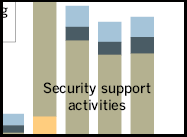
|
||
|
Although Republicans have taken the lead in calling out the TSA in the current session, Rogers bristles at the suggestion that their criticism is just an attempt to bash the administration.
“It drives me nuts,” he says. “The truth is that TSA had problems when George Bush was president, and they were the whipping boy then. This is not partisan.”
What the GOP is doing, Rogers says, is trying to re-examine the TSA and repair years’ worth of errors. Although some lawmakers from his party have gone so far as to call for abolishing the TSA, he dismisses that notion and says other lawmakers who watch the agency closely wouldn’t seriously consider it.
Screening the TSA
“We have got to have TSA,” he says. “I’ve talked to other members of Congress who have said that we just need to eliminate TSA. And the first words out of my mouth are, ‘You can’t do that. You don’t know the threat that I know. You’re not in the classified briefings.’”
Calls to eliminate or severely curtail the TSA have led some Democrats into the territory of invoking Sept. 11, a position that the GOP had previously staked out.
“Can we do a little bit more explaining as to what TSA does and what its vital role is, complement that with improvement, but not ignore that they were put in place because of the horrific terrorist act that took 3,000-plus lives?” says Jackson Lee, who expresses surprise at the degree of Republican vitriol.
While the TSA has its Democratic backers, the agency doesn’t have much in the way of loud, unconditional defenders. Owing to the agency’s size and scope — it not only handles a multitude of programs associated with aviation passenger and cargo screening, but also has a role in freight rail, intercity buses, trucking and the credentialing of port security workers — lawmakers have an easy time finding something about it they don’t like.
On the House Homeland Security Committee, ranking Democrat
Thompson acknowledges that in the TSA’s first years, Democrats were among its biggest critics, questioning whether it trampled on civil liberties. Negative attitudes toward the TSA on Capitol Hill are partly an outgrowth of politics and partly due to legitimate policy disagreements, Thompson says. Add in its high profile, he says, and the TSA faces unmatched congressional pressure.
“A lot of people now question every move they make,” he said. “And they have to justify it, maybe more than any other agency.”
Turning Back the Clock
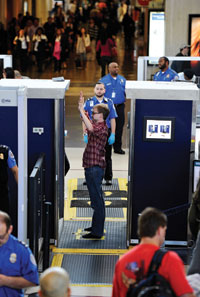
|
||
|
The TSA comes in for a fair degree of bipartisan criticism — lawmakers on both sides of the aisle see body-scanning as a privacy problem, for example. But a GOP push to convert a significant portion of checkpoint screening jobs into privately contracted positions has opened a policy gap between the parties.
Republicans have portrayed the proposal as a way to improve the agency, saying that it isn’t geared to managing such a large workforce. Mica told TSA Administrator John S. Pistole earlier this year that he wants him “out of the personnel business and into the security business.” Rogers, an advocate for increased privatization who argues for a workforce cut of at least 25 percent, takes the same position.
Opponents of moving to a screening force that is off the federal government’s payroll say that move would yield neither increased security nor lower cost — and would return the country to something close to the system it was using before Sept. 11.
Pistole says that private screeners would actually cost more and that a federal workforce gives him the ability to redeploy staff to adapt to evolving security situations. The TSA didn’t help his case, though, initially saying contractors would cost 17 percent more than federal workers, then walking that number back to somewhere between 3 percent and 9 percent, prompting Republicans to say they don’t trust the agency’s figures. Still, Democrats have supported Pistole’s arguments. Any change required in screening procedures, Jackson Lee says, “would require a change in the contracts. We wouldn’t have full control.”
Screening the TSA
At airports with private screeners, the TSA provides supervisors to watch over the operation — too many, according to some Republicans. But Thompson says he walked away from a September briefing with TSA leaders concerned that the agency doesn’t have nearly enough oversight power for its contractors. While TSA officials can watch checkpoint operations, he says, they can’t access contractor records to see if there are any structural problems.
“You’ve really outsourced the whole security mission without leaving TSA with any authority to make sure that standards and metrics are being met,” Thompson says. “They can’t go in and fix it.”
The argument is in some ways a reversal of the positions that Democrats and Republicans took when TSA security workers pushed for collective bargaining powers in the first years of Obama’s presidency. While Democrats, including Thompson, supported collective bargaining, many Republican lawmakers were staunchly opposed. The GOP’s main argument: They wanted to preserve the administrator’s flexibility for redeploying workers. Pistole granted TSA employees the ability to bargain collectively in 2011.
Hawley says the math employed today by advocates of private screeners doesn’t work — if only because the contractors are out to make a profit.
San Francisco International Airport is the largest in the United States to use contract security workers, and it is a model of efficiency according to Mica, Rogers and others. But Hawley notes that it also has a unionized workforce — with all the attendant costs.
“Privatization is simply outsourcing the job of TSA,” he says. Current law requires contractors to follow TSA standards and procedures. Unless Congress changes that, he says, “it’s just the same thing with a profit margin.”
Image Problems
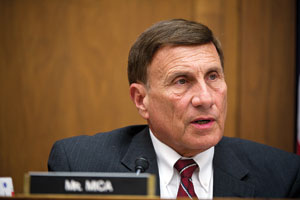
|
||
|
No matter how successful the TSA has been at safeguarding flights, many lawmakers and members of the public aren’t pleased with the agency, and that may affect the amount of funding lawmakers are willing to provide.
“We have got to start recognizing that there are some image problems with the public, and I’ve told this to Administrator Pistole and the agency heads — they’ve got a real PR problem with the Congress,” Rogers says.
How the TSA burnishes its image without sacrificing security is an open question that Kettl calls difficult to answer.
“In the absence of a perceived threat, TSA could face pressure because it does things that are unpopular and uses a lot of money to do it,” he says. “You could always do what you’re doing better, but, sadly for TSA, there’s not much that they can do about its mission.”
Not all of the anecdotal evidence is negative. “Most people I’ve talked to — and I haven’t seen polling — recognize that they’re doing it for their own protection,” Lieberman says. Knowing that everyone on the plane has to go through the same procedures gives passengers confidence that they’re flying safely.
Screening the TSA
“There’s a lot more going on when you go through a security checkpoint than you think,” he says. “There’s a lot more than taking your shoes off, a lot of screening going on that has had a major impact.”
But it’s the unpleasant interactions that frequently form the basis for policy discussions in Congress. In January, Republican Sen.
At a June hearing where Pistole testified, Rogers began his questions by telling the agency chief, “I was in Chicago O’Hare this Monday. And I’m just telling you, it’s palpable. The American people are just really disgusted and outraged with the department that they see is bloated and inefficient.”
TSA officials have described it as frustrating when lawmakers confront them with anecdotal horror stories. The agency maintains that most travelers are satisfied with its work.
“We don’t hear from the 99.9 percent of people traveling every day who had a positive experience, or at least a neutral experience, which is the vast majority,” Pistole told lawmakers in June.
He cited a May incident where former Secretary of State Henry A. Kissinger, who was in a wheelchair, received a pat-down at New York’s LaGuardia Airport. A freelance journalist who witnessed the incident reported it as “the full Monty.” And it became fodder for blog posts blasting the TSA.
Kissinger, however, later praised the TSA for its courtesy during the screening, saying he received the pat-down because he wears a leg brace and can’t take off his shoes for scanners. “He sent me a personal letter with that same information,” Pistole said.
TSA Assistant Administrator for Security Operations Christopher McLaughlin says the agency and Congress are essentially speaking different languages. “We listen to anecdotes and always evolve our processes based on that, but we have to be data-driven,” he says. “We can’t run an organization that sees 1.8 million people a day by relying on anecdotes.”
Anecdotes and personal experience are powerful motivators, though. Rogers says much of the negativity toward the TSA can be chalked up to the fact that lawmakers are frequent fliers. As such, they see inefficiencies such as screeners sitting idly at checkpoints or agents “asking people to do what they consider to be stupid things.”
Hawley says lawmakers get a better picture of how the TSA works than most Americans. “They’re a barometer of how TSA is doing with the public,” he says. “The members of Congress fly every weekend. And when they’re not happy, you literally feel it every time you testify before them.”
Calculated Risk
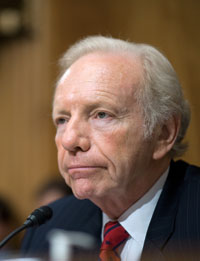
|
||
|
One possible answer the TSA has developed for congressional pressure is a constant emphasis that it’s moving toward “risk-based” screening, which uses intelligence both to identify low-threat travelers and to tighten the focus on potential terrorists.
Screening the TSA
Those initiatives have included a “trusted traveler” program called PreCheck that offers participants in some airline frequent-flier programs the possibility of quicker, more convenient screening in exchange for providing additional personal information. At Congress’ urging, the TSA has also given children, seniors and World War II veterans on honor flights the ability to forgo pat-downs. And the agency has a program to expedite screening for airline pilots and flight attendants.
Such measures aren’t true improvements to the security system, Hawley says, but rather are designed to placate lawmakers. “Those are politically risk-based. It might not be terrorism risk-based,” he says, noting that Homeland Security agencies have been implementing risk-based adjustments since 2005.
TSA officials, though, are positive about the changes. Pistole told Congress in February that the new measures are “helping move TSA toward becoming a high-performing organization with a counterterrorism focus.”
Considering that many of those new policies involve allowing a certain population of travelers to avoid screening procedures designed to find weapons and explosives, the TSA has to exercise caution in how far it’s willing to go, Kettl says. Some groups identified as non-threatening by lawmakers, including children and the elderly, have been used in suicide attacks in the Middle East. Those same groups, along with pregnant women and the disabled, have been used in drug and contraband smuggling.
Just five months ago, TSA officials found parts that could be assembled into a loaded gun concealed within three stuffed animals a 4-year-old was carrying onto a plane in Rhode Island. Authorities concluded the incident appeared to be the result of a domestic dispute, not a threat to the airplane’s security. But Kettl says the incident shows that the TSA has to watch all travelers, even those who seem unlikely to be threats.
Pistole has been unequivocal that the agency won’t take chances on security, even with the risk-based procedures. His officers will always retain the ability to perform random screening and to investigate suspicious situations, he said during the February hearing.
“Our goal and No. 1 priority is to provide the most effective security in the most efficient way,” Pistole said.
But if the TSA is hoping that congressional opinion is going to turn around because of those policy revisions, it may be doing so in vain. In recent months, even the new measures have come under fire. Lawmakers say they still like such expediting programs as PreCheck but complain that the agency is implementing them too slowly.
“It’s not enough that the agency is becoming more risk-based,” Rogers said in June. “The American people need to see immediate changes that impact them.”
Jennifer Scholtes and Tim Starks contributed to this story.
FOR FURTHER READING: FAA reauthorization (PL 112-95), CQ Weekly, p. 407; fiscal 2012 appropriations (PL 112-74), 2011 Almanac, p. 2-41; implementing recommendations from 9/11 commission (PL 110-53), 2007 Almanac, p. 13-3; creation of Department of Homeland Security (PL 107-296), 2002 Almanac, p. 7-3; TSA creation (PL 107-71), 2001 Almanac, p. 20-4.